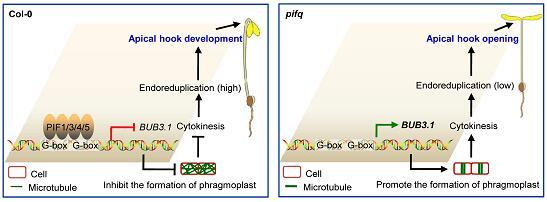
Credit: WANG Lei
To protect their newly formed fragile organs, dark-grown dicotyledonous plants form an apical hook when penetrating through the soil. The apical hook of pifq (pif1 pif3 pif4 pif5) mutant was fully opened, even in complete darkness, suggesting that PIF proteins are required for maintaining the apical hook in the darkness and are involved in regulation of the apical hook opening. But the underlying mechanism for PIF proteins mediated apical hook development remains elusive.
To better understand how PIF proteins affect apical hook development, scientists from the Institute of Botany of the Chinese Academy of Sciences recently investigated their roles in an organ specific manner. The study was published in the journal Cell Reports on May 11.
The researchers performed organ-specific RNA-sequencing of the cotyledons, apical hooks and hypocotyls of etiolated Col-0 and pifq mutant seedlings, respectively. Interestingly, the scientists found that the genes involved in the regulation of cell cycle were significantly enriched in differentially expressed genes (DEGs) of the cotyledons and apical hooks, but not in DEGs of the hypocotyls.
Transcriptomic analysis combined with previous ChIP-seq data reveal that BUB3.1 is a potential common target gene of PIF proteins. Indeed, the researchers demonstrated that PIF proteins directly bind to the promoter BUB3.1 and inhibit its transcription. Importantly, BUB3.1 overexpression in transgenic lines leads to a partial apical hook opening phenotype, indicating that the higher level of BUB3.1 in pifq mutant at least in part contributed to its apical hookless phenotype.
Previously, BUB3.1 was shown to majorly function in microtubule reorganization during cytokinesis through facilitating MAP65-3 to localize in the phragmoplast. Consistently, the phragmoplast could be clearly observed in dark-grown pifq and Col-0 etiolated seedlings exposed to light for only 6 hours, but not in the etiolated Col-0 seedlings. In addition, the researchers also showed that cell ploidy for cotyledons and apical hooks of pifq mutants is significantly lower than for the wild type. However, cell ploidy in the hypocotyl is not significantly different regardless of type, indicating that PIF proteins can regulate cytokinesis in an organ specific manner such as in the apical hook or cotyledons.
To further investigate the role of cytokinesis in the apical hook opening, the researchers applied caffeine, a well-known potent inhibitor of phragmoplast-based cytokinesis, to the wild type etiolated seedlings. Evidently, the researchers found that caffeine treatment significantly promotes the hook curvature of wild-type etiolated seedlings, suggesting cytokinesis might be involved into the apical hook development.
Altogether, this study reveals that PIF proteins can regulate cytokinesis in the apical hook and cytokinesis may affect the development of the apical hook. Hence, their work demonstate that PIF proteins may play organ-specific roles, in hypocotyl to regulate cell elongation, while in apical hook and cotyledons to regulate cell division.
###
Media Contact
WANG Lei
[email protected]
Related Journal Article
http://dx.




